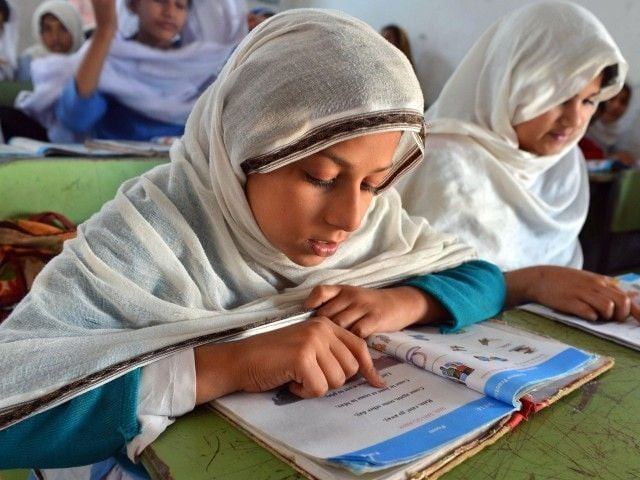Private school students doing way better than govt ones: ASER
One system of education for all proposed as solution to learning crisis

One system of education for all proposed as solution to learning crisis. PHOTO: FILE
The report revealed that 53% of students in private schools can read Urdu or Sindhi while only 34% of public school students are able to read. Similarly, 64% of private school students, as compared to only 26% of public school students, are able to read at least one word in English. In case of arithmetic, 56% of private school students and only 33% of public school students can do simple subtraction.
Stop trying to make private schools cheaper, improve govt schools instead
Since 76% of all school-aged children, among the ages of six and 16 years, are enrolled in schools, these statistics become worrying considering 88% of them are enrolled in public schools whereas only 12% are going to non-state institutions, such as private schools and madressas.
The experts gathered at the provincial launch of the report at Movenpick hotel felt the fault lies somewhere in the disparity of education systems our children have access to. To make the education system better, the clear division between the rich and the poor should be removed, said Muttahida Qaumi Movement MNA Dr Fouzia Hameed.

SOURCE: ASER 2015 REPORT
“We have a clear division between rich and poor education, which is the main reason why Sindh has failed to outperform,” she claimed, adding that the division between Matriculation and Cambridge system should be finished and one system should be applied to all.
Discrimination alleged: ‘Government victimising middle-class schools’
Pakistan Tehreek-e-Insaf MPA Khurram Sher Zaman pointed out another way to improve the education system in Sindh. These figures can only be turned around when parliamentarians start working for their constituencies, he said.
This acceptance of the education crisis facing Sindh has, however, eluded the education department. Sindh education secretary Fazlullah Pechuho only blamed NGOs for portraying a negative picture of Sindh. He was referring to the dismal performance of Sindh recorded in the Alif Ailaan report launched earlier this week.
These organisations fail to appreciate the positive initiatives taken by the Sindh education department to improve schools and control absenteeism, he said. “It will take at least 10 years to see results in Sindh because changes do not come in a day,” he said, appreciating Aser for working on ‘ground realities’ in the province.
Research findings
Aser report, which focuses on 13 themes of access to schools, learning levels, paid tuitions, gender gaps, parental education and teacher- and student-absenteeism, is compiled every year through surveys conducted by more than 10,000 volunteers after visiting villages, explained Idara-e-Taleem-o-Agahi research associate Minahil Adeel.
Private schools unhappy with regulatory bill
The findings for this year’s report were collected after interviewing 14,668 households in 737 villages across the province. The information was collected on 44,713 children between the ages of five and 16 years, 58% of whom were girls and 42% were boys.
The provincial report showed that Sindh has been second-last among all other provinces in terms of enrolment of students aged between six and 16 years. District Ghotki is the only district in Sindh which has above 70% enrolment of children between three and 16 years, while seven districts — Kashmore, Tharparkar, Shikarpur, Sanghar, Tando Allahyar, Matiari and Hyderabad — are the lowest and below 30%.
There is some good news as the overall percentage of out-of-school children has gone down from 27% in 2014 to 24% in 2015.
Sharing the other findings of the survey report on early childhood education, Aser Pakistan programme manager Sahar Saeed shared that 37% of all children aged between three and five years were enrolled in schools. However, 63% of these children are still not enrolled in early childhood programmes or schooling.
The class-wise learning survey shows slight improvement as now 55% of class-five students cannot read a class-two story while 59% could not do so until last year. The survey also found out that more private school students are going for paid tuitions as compared to public school students.
Published in The Express Tribune, May 27th, 2016.


















COMMENTS
Comments are moderated and generally will be posted if they are on-topic and not abusive.
For more information, please see our Comments FAQ